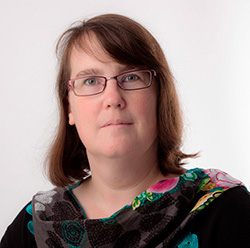News & Notices
Member Spotlight: Eileen Curley
 Q&A with Marist College English Professor and TD&T Editor, Dr. Eileen Curley.
Q&A with Marist College English Professor and TD&T Editor, Dr. Eileen Curley.
How did you get involved in theatre?
I was trying to register for a Spanish class in college, but it was full. The registration tables were alphabetical and my theatre professor, who ended up being my advisor, was sitting next to the Spanish table. She started heckling me and said, “oh come on, I know you do theatre!” I said, “Yeah, in high school.” She then said, “You need to take stagecraft.” I had no idea that was a class and I got sucked in from there.
Do you design when you’re not teaching English?
I was hired into the English department at Marist College to teach theatre classes and work on shows periodically so I do still design every couple of years for shows on campus, even though it’s an English department. We have a small theatre program that’s mainly club based and I do dramaturgical work for colleagues at other campuses periodically as well.
Any pieces of writing that have made an impact on you throughout your career?
The part I enjoy the most is that I get to learn new things about different topics and work with the authors to communicate their joy about those topics. The fun for me isn’t one article, it’s getting to see these different things all the time.
I’m not always involved in the day-to-day of theatre as I would sometimes want to be, so the editing helps. It brings me not only back into it, but into the entire discipline as opposed to just scenic design. I declared theatre as an undergrad because I couldn’t decide between six majors. Who knew I could get all of them in theatre? In some ways, editing continues that.
What kind of challenges do you face as the editor of TD&T?
It’s the learning curve of any new job. You must learn about the people you’re working with and figure out how to encourage and support them in a way that allows them to produce their best work.
I had a professor in graduate school, Wes Peters, who could do that. He would sit in a classroom full of people and just know what everybody needed and intuitively give you the feedback you needed in the way that you needed it to be capable of producing your best work. That has always been a goal of mine and this is a setting in which I must hone that skill.
The turnaround for TD&T is a lot faster than the turnaround in a classroom. You’re giving students feedback for the long-haul whereas for TD&T, you’re working with people on a much different timeline and you must figure out how to do that well.
What are your goals for TD&T within the next few years?
I’m committed to diversifying the author pool as well as the content. Obviously, we’re not going to be able to fit one piece from each Commission in each issue because there’s not enough space, but if we can get pieces that can apply to multiple disciplines and that are interesting to everybody in the membership, then that is a clear and obvious goal. Bringing in new voices while also supporting our frequent contributors so that we’re getting more people involved in publication is the next big goal.
There is new technology that I find fascinating that I think we need to start looking at as well as ongoing safety issues. I’m trained as a theatre historian and designer, so I’m always going to be drawn to those topics, but I think there’s a way to cover them in TD&T that is fascinating and accessible that can reach a broader audience.
How would you describe TD&T to a new reader?
It’s a print celebration of what we do as a discipline. Sometimes it’s a very in-depth exploration of how to solve problems and the reasons we’re trying to solve those problems. Other times, it’s a celebration of our history and how that is still with us and influencing our work. Sometimes it’s very hands-on and advice-driven like some of the safety pieces.
I think that’s part of what we strive to hit each issue—to reflect that breadth and diversity of what we do, why we do it, and why it’s valuable.
TD&T is valuable to USITT because it allows the members to take a break every now and again and see what else is going on out there and bring us out of whatever little world we’re living in.
How has USITT played a role in your life since becoming TD&T editor?
It’s been lovely to be reconnected with the whole discipline. The Conference is great because it’s a week of in-depth exposure. With USITT, the great part about editing is that it’s there every day. I open up my USITT email account and there’s all kinds of cool stuff in it whereas when I open up my other two email accounts, I’m usually not going “Oh! That’s fun.” I look forward to opening my USITT email and finding an article submission for TD&T. I get glee in my email now!
Suggest a USITT Member for the Spotlight!
If you know of USITT members whose work should be in the Spotlight, please feel free to suggest them. Contact Lynne Dundas at jenn@usitt.org.

